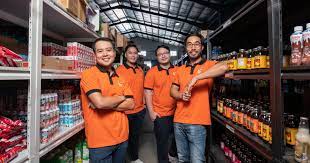/ Philippine startup, others have lesson for Big Tech: Serve society
Philippine startup, others have lesson for Big Tech: Serve society

A few minutes driving around Greater Manila reveals some of the Philippines' various problems, headaches that don't seem to be going away anytime soon.
Hundreds of cars, trucks, motorcycles, even old-fashioned shared taxis called jeepneys congest the roadways. Pedestrians weave their way through the gridlock. Between the streets, small neighborhoods spread out under chaotically hung electric wires.
Modern shopping malls are being built one after another along the main road, but their products are too expensive for the masses under those wires.
These Filipinos predominantly rely on traditional wet markets to buy fresh produce. However, distribution channels are complicated, and the quality of their merchandise is unstable.
Now Bam Mejia, the co-founder of Sarisuki, says "modernizing" his country's food infrastructure is his 2-year-old startup's mission. With Sarisuki's smartphone app, anyone can open an online grocery store and become what the company calls a "community leader."
Community leaders promote their online stores, and take customer orders according to neighborhood needs. Sarisuki then delivers the products to the community leader, who covers the "last mile" to customers' homes. The startup and community leaders share the proceeds.
With a smartphone and Sarisuki, Mejia says, customers can buy better quality food at "lower prices," and many will also have an opportunity to earn an income. Sarisuki holds an inventory of about 5,500 foods and daily necessities.
The business model is similar to that of Asia's popular social shopping platforms. At the same time, it is highly localized, taking the Philippines' distribution infrastructure and income brackets into consideration.
Mejia built his career at Procter & Gamble, the world's leading consumer goods company. Sarisuki CEO Brian Cu, a close friend of Mejia's, was one of the founding members of Gojek, which has become one of Southeast Asia's leading superapps. He later led the Philippine business of Grab, Gojek's superapp rival.
Sarisuki is increasing its purchases of vegetables and other produce grown in fields near Manila, and has also started to produce it by partnering with local farms. By streamlining the process from producing and purchasing to sales, Sarisuki will be able to offer a "better price for farmers and sell to consumers at lower prices," Mejia says.
Projects such as Mejia and Cu's might eventually become a solution to food self-sufficiency fears in a country with a swelling population.
Sarisuki's mission overlaps with the "triple win" principle of the Omi merchants who prospered in Japan during the Edo period (1603-1867) and Meiji era (1868-1912). They were highly respected, advocating that businesses should always benefit three parties, the seller, buyer and local community.
The Philippine startup also seems to be practicing the "tap water philosophy" of delivering good products as abundantly and inexpensively as faucet water. The philosophy was espoused by Konosuke Matsushita, who founded Panasonic in the early 1900s and is known as the "god of management" in Japan.
Sarisuki does not form a vanguard of one. Already mentioned are Gojek and Grab, which have transformed the lives of tens of millions of users across Southeast Asia. Founders of fintech, ed-tech and health tech startups also aspire to solve social problems -- little to no access to financial services, education and health care -- by exploiting digital technology and creating business opportunities.
Just like any startup, it's unclear whether Sarisuki and others will be able to achieve their lofty goals. The decline in global venture investment due to the recent drop in tech stocks is forcing many entrepreneurs to revise their strategies. Sarisuki already has decided to withdraw from the capital-intensive instant commerce business.
Still, the Philippines and other Southeast Asian nations are providing startups with their raison d'etre -- opportunities to transform substantial social issues with digital technology and new business models.
In developed markets, on the other hand, social strife with Big Tech is only deepening. The massive shares that colossal corporations control in many key tech markets make it difficult for new entries with fresh ideas to gain a foothold. Around the world, the overconcentration of personal data also raises concerns.
Tech companies in developed nations can learn a lot about serving society better from entrepreneurs in emerging countries.






